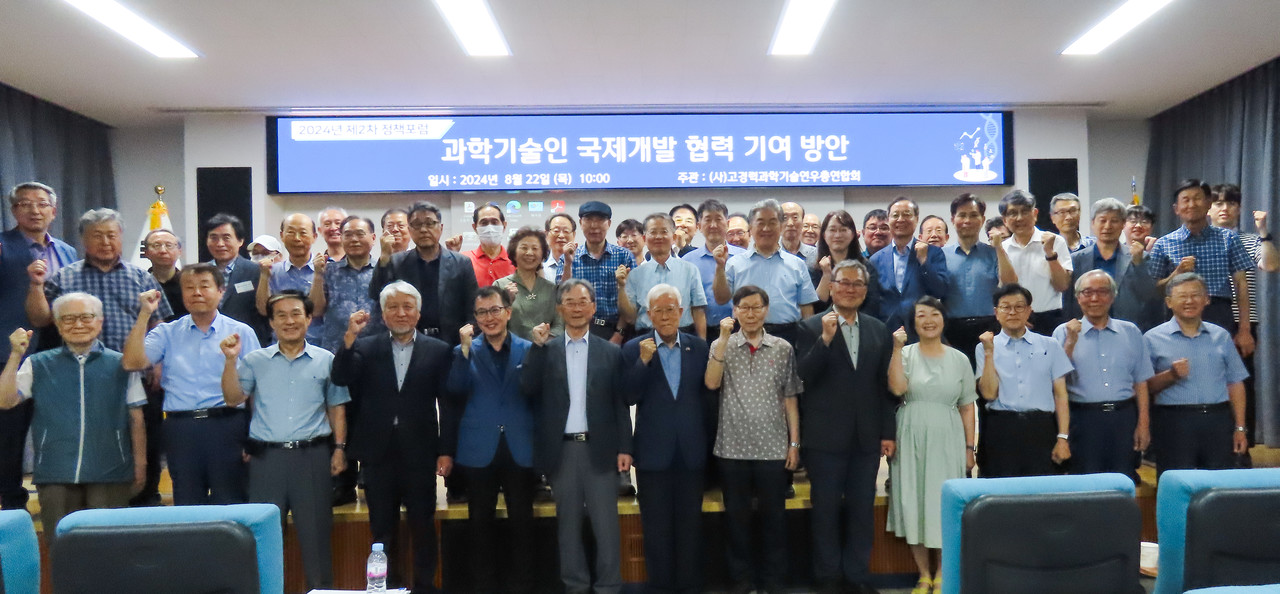Allocate 20% of ODA Funds to Science and Technology Support
Association of Korean Science and Technology Research Institutes Holds Forum on International Development Cooperation This Year’s ODA Budget is 6.2629 Trillion Won

To enhance the effectiveness of South Korea’s international development cooperation 20% of the Official Development Assistance (ODA) funds should be allocated to science and technology support proposed Hong-Yeol Baek former director of the Agency for Defense Development (ADD) on the 22nd.
Dr. Baek presented this recommendation during the forum titled Exploring Ways for Senior Scientists and Engineers to Contribute to International Development Cooperation hosted by the Association of Korean Science and Technology Research Institutes (Chairman: Dong-Man Ahn) at Daejeon Technopark on the same day.
The forum focused on discussing the importance of ODA in the field of science and technology South Korea’s role and ways for senior scientists and engineers to participate in these efforts.
Professor Seong-Ho Choi from Sookmyung Women’s University delivered the keynote presentation titled A New Beginning: Participation and Improvement Plans for Scientists and Engineers in ODA Projects emphasizing the importance of international cooperation in science and technology. He noted that while South Koreas ODA budget for 2024 amounts to 6.2629 trillion won the allocation for science and technology—such as research and development investment scientific research and capacity building—remains relatively insufficient compared to social overhead capital (SOC) projects which are crucial for improving education quality and job creation in developing countries.
Professor Choi proposed the implementation of ten leading science and technology ODA projects suggesting a four-pronged approach involving research institutions specialized universities in science and technology science and technology clusters and ICT infrastructure development.
The forum’s panel included prominent figures such as Dong-Hwa Geum former president of KIST Jin-Cheol Kim former vice president of the Korea Aerospace Research Institute Hong-Yeol Baek and Dr. Hyun-Jung Kwon from KAIST’s Global Cooperation Center (GCC).
Dr. Geum compared the ODA profiles of South Korea and Germany sharing his experience in establishing and operating V-KIST. He noted that while South Korea’s ODA has grown quantitatively qualitative improvements are necessary particularly in areas such as Science Technology and Innovation (STI) and partnerships.
Dr. Baek drawing on his eight years of experience supporting space development at Adama University in Ethiopia presented a basic regional strategy for international cooperation in science and technology. He emphasized that cooperation with developing countries should aim to expand markets and national influence through science and technology support. He also recommended that 20% of ODA funds be allocated to science and technology advocating for a policy approach that focuses on nurturing pro-Korean personnel through scientific and technological education as part of national diplomacy.
Dr. Kim presented the industry-academic cooperation support plan for Vietnam’s TDT University and the operational case of the Korea Expert Center (KEC) highlighting the potential for international cooperation including mutual cooperation between South Korean and Vietnamese startups.
Dr. Hyun-Sung Kwon introduced examples of South Korean companies expanding overseas through GCC and suggested active participation by senior scientists and engineers.
Participants at the forum reached a consensus on the importance of science and technology ODA and South Korea’s role sharing various opinions on ways for senior scientists and engineers to engage in international development cooperation by leveraging their experience and expertise.
There was a shared recognition that science and technology ODA could serve as a crucial stepping stone for South Korean companies’ expansion abroad in addition to contributing to the development of developing countries. Therefore active participation by senior scientists and engineers who have been foundational to South Korea’s development is essential.
The Association of Korean Science and Technology Research Institutes plans to propose specific policies to expand science and technology ODA and facilitate the participation of senior scientists and engineers.
Website: : http://www.wip-news.com/news/articleView.html?idxno=24724
